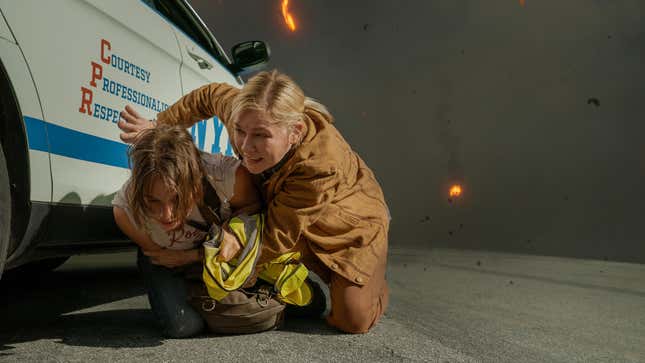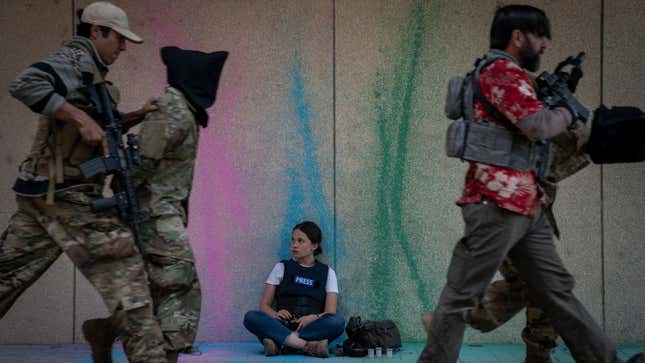The trailers for Civil War, the latest film by Alex Garland, give the audience a very specific expectation of what they’re going to see. It looks like a film about a United States that is so divided politically, certain states have seceded and the country is at war. A scenario that’s, clearly, a fictionalized nightmare version of our present, where America’s Left and Right have turned to violence. And, in a way, Civil War is that. But it’s also not and that’s why it’s so damned fascinating and special.
Written and directed by Garland (Ex Machina, Annihilation), Civil War is, indeed, about a United States that’s no longer united. A United States at war with itself, hence the title. But one of the main combatants in this war is the Western Forces, a group comprised of California and Texas. Now, everyone knows California and Texas are maybe the two most polar opposite states in our current political climate. So that’s the first clue Civil War isn’t a by-the-book, pro-left, anti-right Hollywood tale. It has an agenda, for sure, and that agenda is certainly more inclusive than not, but Garland very specifically makes it clear that his America is not our America. Thereby, no matter who is watching the movie or what they believe, they can very easily enjoy the story without bias.
In other words, the movie is as objective as possible which, not coincidentally, is also the primary ideology of the film’s main characters: a group of journalists. Kirsten Dunst plays Lee, a famous war photographer traveling the country with a fellow journalist named Joel, played by Wagner Moura. After documenting a terrifying, but all too common, act of violence in New York, Lee and Joel decide to take a trip to Washington D.C. to attempt to interview the president, played by Nick Offerman. Colleague Sammy (Stephen McKinley Henderson) thinks it’s a bad idea, but goes along for the ride anyway, and they also pick up Jessie (Cailee Spaeny), an aspiring photographer who sees Lee as a hero and mentor.
And so the four journalists leave New York for D.C, which is usually an uneventful four or five-hour drive. In this world though, with everything happening across the country, it becomes a much longer, more arduous trip. Certain roads are blocked off. Other areas are not safe. And soon, the group realizes no matter which way they go, there is danger and terror at every turn.
Civil War is Alex Garland’s most mature movie to date. As he sets his characters off on this road trip, you can almost feel him not pushing the agenda one way or the other. An energy permeates the film, as if Garland wants to say something but is shaking and buzzing to hold it back. Much as the journalist heroes continue to preach objectivity and the importance of reporting the facts, no matter the circumstance, Garland too unfurls his narrative accordingly. Lee, Joel, and the crew approach each situation the same way: from a place of care and kindness. Sometimes that works, other times it doesn’t. Often, the most dangerous things we see aren’t in the center of the frame. A burning building here. A pile of bodies there. And while Joel and Lee’s distaste for the president certainly codes them as sympathetic to the WF, the film never really says what the WF stands for. We’re left to wonder, is it more Texas? Or more California?
That the film avoids ever defining the root of the conflict is one of the best things about the movie. Contrarily, one of the worst things is as the characters make the trek from New York to D.C. things can get a little repetitive. They drive, encounter an obstacle, learn something, and move on. Then they drive, encounter an obstacle, learn something, and move on again. The pattern repeats itself a few times and while each of those obstacles unfolds in a different, usually surprising way, some of the film’s momentum does falter following this structure.

Where Civil War doesn’t falter is portraying intensity. Whenever the heroes encounter one of those obstacles, be it a booby-trapped gas station, hidden sniper, or a pink-sunglassed Jesse Plemons, the film’s tension always gets turned to 11. We are rarely sure what’s going to happen, and who is going to survive, primarily because of that objectivity. No one is treated like a hero or villain at the start. That changes scene to scene, of course, but the film, like the journalists, gives everyone an equal shot, which can be scary.
That can also make you question yourself, your biases, and more. Civil War is a film that challenges its audience to put themselves in the shoes of not just the main characters, but everyone. Partially that’s because everything in the movie seems so plausible that we see ourselves, our friends, and our neighbors in it. But it’s also because the performances are all so strong across the board that it’s easy to relate.
It feels like it’s been forever since we’ve seen Kirsten Dunst in a big, showy, starring role like this and watching Civil War, you have no idea why. Dunst gives a nuanced, powerful performance as Lee, a veteran so confident in herself that she’s almost carefree. That is until she meets Jessie. In Jessie, Lee sees a younger version of herself and it terrifies her. Lee knows Jessie, portrayed with lots of raw emotions by Spaeny, is dooming herself to danger. Choosing this life is probably the wrong thing for her. And so what should be a simple, mentor-mentee relationship is always strained. Lee sees too much of herself in Jessie, and Jessie doesn’t care.

Their complex relationship, as well as the gravitas provided by Moura’s Joel and McKinley Henderson’s Sammy, come to a head in the film’s final act, which sees the team finally make it to Washington. Garland then unfurls a guttural, shocking, ground-level war in the heart of the nation’s capital, featuring views of national monuments and more that feel akin to 1996’s Independence Day. What happens in these scenes I won’t spoil, but it all builds to a final few minutes destined to be discussed and quoted for as long as movies exist. It’s that fantastic.
Ultimately, Civil War is a Rorschach test designed for maximum impact across political ideologies. You can watch it and view it however you’d like. Is not taking a side a bit of a cop-out? Should there have been a bit more of the story leaning left or right? I’d argue the fact it doesn’t have that is the authorship. Garland isn’t necessarily interested in changing anyone’s mind about anything. He wants any and everyone to consider themselves and what those differences could end up becoming. And hey, if playing it down the middle helps more people see it, that’s just a bonus.
Civil War is in theaters Friday.
Want more io9 news? Check out when to expect the latest Marvel, Star Wars, and Star Trek releases, what’s next for the DC Universe on film and TV, and everything you need to know about the future of Doctor Who.
Trending Products

Cooler Master MasterBox Q300L Micro-ATX Tower with Magnetic Design Dust Filter, Transparent Acrylic Side Panel…

ASUS TUF Gaming GT301 ZAKU II Edition ATX mid-Tower Compact case with Tempered Glass Side Panel, Honeycomb Front Panel…

ASUS TUF Gaming GT501 Mid-Tower Computer Case for up to EATX Motherboards with USB 3.0 Front Panel Cases GT501/GRY/WITH…

be quiet! Pure Base 500DX Black, Mid Tower ATX case, ARGB, 3 pre-installed Pure Wings 2, BGW37, tempered glass window

ASUS ROG Strix Helios GX601 White Edition RGB Mid-Tower Computer Case for ATX/EATX Motherboards with tempered glass…










